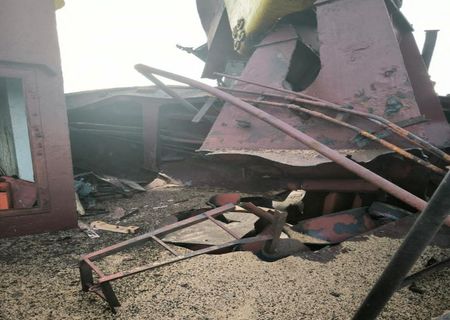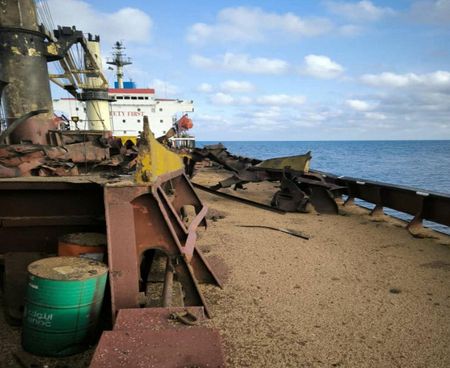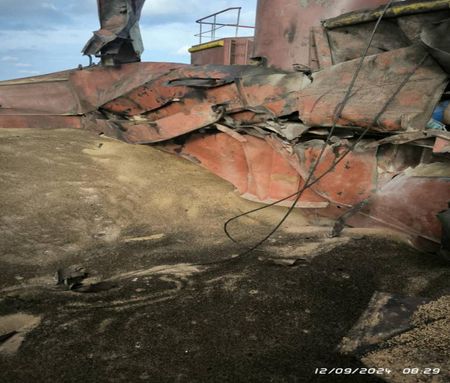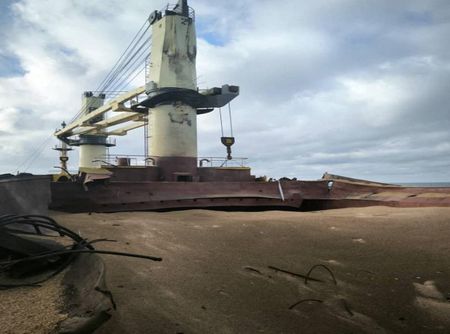By Pavel Polityuk, Yuliia Dysa and Tom Balmforth
KYIV (Reuters) -Ukraine accused Russia on Thursday of using strategic bombers to strike a civilian grain vessel in a missile attack in Black Sea waters near NATO member Romania, escalating tensions between Moscow and the military alliance.
President Volodymyr Zelenskiy said the vessel carrying Ukrainian grain to Egypt had been hit overnight by a Russian missile just after it left Ukrainian territorial waters. There were no casualties, he said.
The U.S. ambassador to Ukraine “strongly condemned” the attack and said Russia was responsible. A United Nations spokesperson said the incident was a “stark reminder” of the threats still faced in the Black Sea by civilian vessels.
There was no immediate comment from Russia.
Ukrainian Foreign Minister Andrii Sybiha said the strike was “a brazen attack on freedom of navigation and global food security”. Ukraine’s navy said Russian Tupolev Tu-22 bombers had fired a number of cruise missiles at 11:02 p.m. local time (2002 GMT) on Wednesday.
It was the first time a missile has struck a civilian vessel transporting grains at sea since the start of Moscow’s invasion in February 2022. Some vessels have been damaged during Russian attacks on Ukrainian ports where they were moored.
The incident comes as Zelenskiy has been trying to court the Global South, including countries such as Egypt – the destination of the grain according to Ukraine – and convince them to join the West in supporting Ukraine in the war.
The strike coincided with discussion over whether NATO allies will allow Ukraine to make deeper strikes into Russia, a step Moscow has warned will elicit a response. The West has accused Iran of a major escalation by supplying ballistic missiles to Russia.
British maritime security company Ambrey said in a note that a Saint Kitts and Nevis-flagged bulk carrier had been struck by a Russian-launched missile after leaving the Ukrainian port of Chornomorsk in Ukraine’s Odesa region.
The vessel sustained damage to its port side, including a cargo hold and a crane, it said.
The Navy identified the vessel as the Aya bulk carrier.
U.S. Ambassador Bridget Brink wrote on X: “We strongly condemn Russia’s attack on a commercial cargo ship in the Black Sea last night. This escalatory attack is a blatant violation of international law that threatens global food security.”
U.N. spokesperson Stephane Dujarric said attacks on civilian vessels and port infrastructure “are prohibited under international law and must stop.
“Ensuring the safety and sustainability of agricultural exports passing through the Black Sea remains critical for supporting global food security and keeping global prices under control.”
Ship tracking data showed the vessel’s last reported position was off the Romanian port of Constanta. The vessel’s Athens-based manager, VRS Maritime Services, could not be immediately reached for comment.
STRONGER WHEAT PRICES
Traders said the incident had contributed to stronger wheat prices by adding to concern over tightening supply in the Black Sea export zone. U.S. futures rose as much as 2% to hit a two-month peak. [GRA/]
Zelenskiy posted images showing the twisted metal of a damaged crane and other damage.
An industry source told Reuters the strike had taken place not far from the mouth of the Danube river. Dmytro Pletenchuk, spokesman for Ukraine’s navy, told Reuters the vessel was in Romania’s maritime economic zone.
A country’s maritime economic zone is an area that extends beyond its territorial waters.
Romania’s Naval Authority said the vessel had not been in its territorial waters and that its assistance had not been requested in any way.
Zelenskiy, writing on X, said: “Wheat and food security should never be targets for missiles.”
Ukraine is a major global grain exporter that has had to battle Russia in the Black Sea to revive its exports through its sea ports since Russia’s invasion imposed a de facto blockade.
The exports were revived later that year – albeit with smaller volumes – from the three ports of greater Odesa under a deal mediated by the U.N. and Turkey that broke down last year.
In August 2023, Ukraine established its own shipping corridor – without Russia’s blessing – after using naval drones and long-range weapons to strike back at Russia’s Black Sea Fleet and push its vessels away from the west of the sea.
The shipping corridor hugs the western coast of the Black Sea before exiting Ukrainian waters and south past Romania and Bulgaria.
(Additional reporting by Jonathan Saul, Olena Harmash, Luiza Ilie, Gus Trompiz; Writing by Tom Balmforth; Editing by Jon Boyle, Timothy Heritage, Andrew Heavens, Ron Popeski and Diane Craft)












